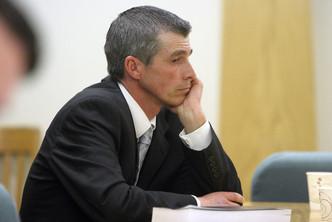Attorney for LDS Bishop Calls Mugshot Unconstitutional
By Geoff Liesik
[with video] DUCHESNE — If there's anything worse than a driver's license photo, it's a mugshot. The Internet is filled with the jailhouse images of the famous, the infamous and even the average Joe. But the defense attorney for an LDS Church bishop accused of failing to report a teenage girl's disclosure of sexual abuse is trying to keep his client from suffering a similar fate. Bishop Gordon Moon, 43, of Duchesne, is charged in 8th District Court with witness tampering, a third-degree felony, and failure to report abuse, a class B misdemeanor. Prosecutors allege that Moon told a teenage girl not to seek a protective order after she told him she'd been sexually abused by a teenage relative. He's also accused of failing to notify police of the girl's disclosure, as required by state law. Moon is only charged, though. He hasn't been convicted of anything. That's why defense attorney David Leavitt is doing everything he can to keep Moon from having to pose for a mugshot. "A mugshot being taken of someone who is presumed innocent is probably the greatest punishment Bishop Moon could receive in this case," Leavitt told the KSL News. In a court filing seeking to prohibit the Duchesne County Jail from taking the photo, Leavitt argues that there is nothing in state law or the Rules of Judicial Administration that requires that a mugshot be part of the pre-trial booking process. Taking such a photo, Leavitt says, would violate Moon's Eighth Amendment right to be free from cruel and unusual punishment. "Given the 21st Century realities of mass communication and data storage, a mugshot posted to the Internet is a punishment — one that could never have been envisioned or imagined by either the United States or Utah constitutional founders — but a punishment nonetheless," Leavitt wrote. "Literally speaking, a mugshot of (Moon), which conveys him as a criminal, will remain on the Internet for as long as the Internet exists," the attorney added. And because mugshots have "become standard recognized marks of criminal activity," according to Leavitt, whether Moon is acquitted or convicted won't matter to those who see his photo. Leavitt's assessment was echoed by the U.S. Court of Appeals for the District of Columbia in a 1996 ruling. "The double-shot picture, with front and profile shots alongside each other, is so familiar from 'wanted' posters in the post office, motion pictures and television, that the inference that the person involved has a criminal record, or has at least been in trouble with police, is natural, perhaps automatic," the D.C. court wrote. But Duchesne County jail commander Jeremy Curry said taking a mugshot of an arrestee is part of the booking process at jails throughout the state because it helps build a database that can be used to easily identify people. "Other types of identification, (like) fingerprints, those can take weeks, sometimes months to identify," Curry said. "To have a photo really helps to (identify an arrestee) on the spot." Jails are also frequently contacted by law enforcement agencies or bail recovery companies for past mugshots of individuals who are now wanted on new charges or have skipped bail, Curry said. In his court filing, Leavitt suggested that, in lieu of a mugshot, Moon could submit a photo of himself to the jail, or the jail could use his driver's license photo. Those are not viable options, Curry said. "Most people don't carry a current photo of themselves," Curry said. "Even their driver's license (photo) could be up to four years old. That would really hinder us in positively identifying them." In addition to a jail's need for a current photo of an arrestee, media attorney Jeff Hunt said mugshots also keep people informed about law enforcement activity in their communities. "There is a legitimate public interest in scrutinizing that process; verifying the identity of individuals who have been arrested and having the public know who they are," said Hunt, who is not involved in Moon's case. He said banning pre-trial mugshots isn't necessary to ensure that someone receives a fair trial. "Judges have a number of tools at their disposal to protect the defendant's right to a fair trial," Hunt said. That includes thoroughly questioning prospective jurors to make sure they haven't been exposed to photographs or other material that might prejudice them against the accused, he said. "We have rules that the courts follow to detect jurors who cannot render a fair verdict," Hunt said. Duchesne County prosecutors are expected to oppose Moon's request that he not be required to pose for a mugshot. Moon is scheduled to stand trial June 1. Contact: gliesik@ksl.com
|
.
Any original material on these pages is copyright © BishopAccountability.org 2004. Reproduce freely with attribution.
